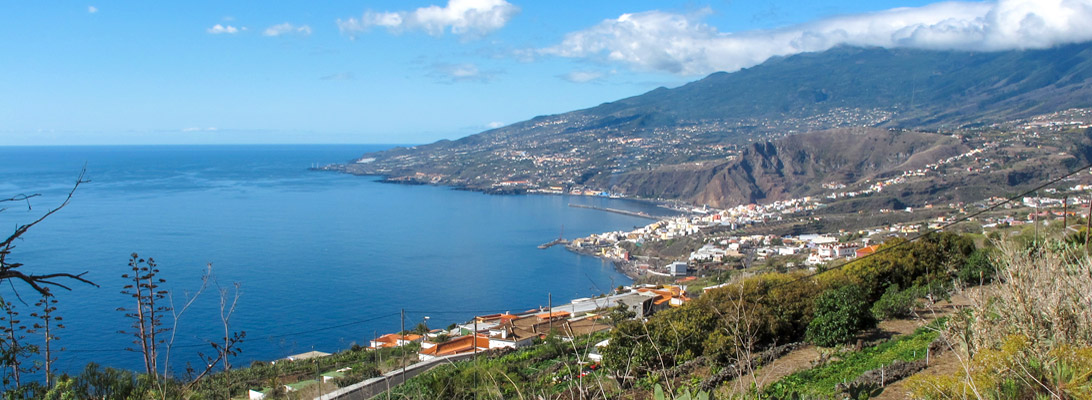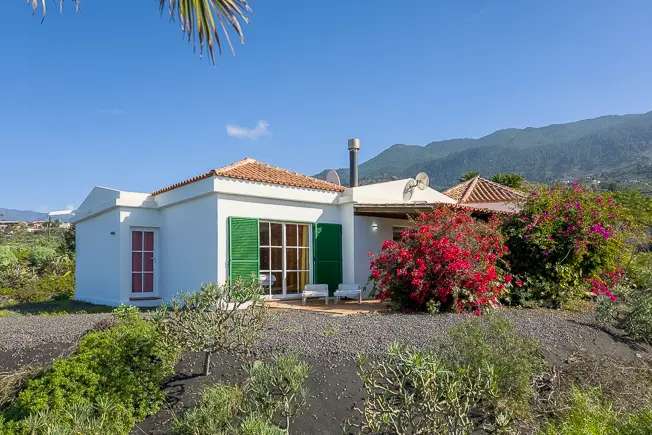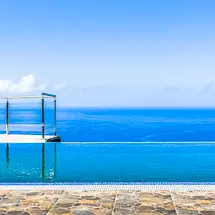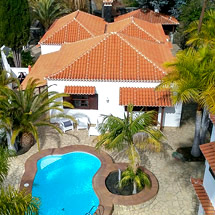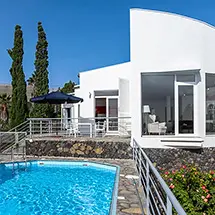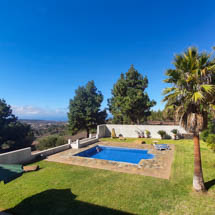La Palma - General Information
Holiday on La Palma - for quick orientation and targeted reference, we offer you clearly arranged tips from "A" like "addresses" over "M" like "money" up to "W" like "Water".
You should also take a look at the tips on traveling with pets or think about how you would like to organize your stay with children on La Palma. From our experience, we can give you some good tips.
Write to us about your own experiences. We are happy to include them in our tips for other visitors to La Palma.
- A -
Addresses
Please see important addresses and telephone numbers
- B -
Banks
Please see post and banks
- C -
Clothing
As a rule, it is sufficient to bring spring or summer clothes, good, sturdy shoes, swimwear, sandals, a sun hat, but also a rain jacket and a warm sweater for cooler evenings. Hikers should bring at least knee-length outdoor trousers.
In public, the same rules of etiquette apply as in all southern Catholic countries: for men no shorts in restaurants or churches, for women no revealing clothing in churches, and for all, swimwear only on the beach.
Credit cards
Visa Card, American Express and Mastercard are accepted. La Palma also has numerous ATMs where you can withdraw money directly with your debit card.
Customs
The following quantities are permitted for import into Germany: 200 cigarettes or 100 cigarillos or 50 cigars or 250 grams of tobacco. In addition to 1 liter of liquors over 22 percent alcohol content or two liters sparkling wine, liqueur or spirits up to 22 percent, in addition, four liters wine and 16 liters beer. Other goods may be exported per adult up to a total value of 430 euros (up to 175 euros for children under 15). Since the abolition of customs controls at the EU's internal borders, however, this has hardly been checked.
- E -
Embassies and Consulates
If you are a German citizen and you have problems with your entry and exit or with your documents, please contact the Honorary Consulate of the Federal Republic of Germany on La Palma, Avenida Marítima 66, 38700 Santa Cruz de La Palma, Tel. 0034 - 922 42 06 89, e-mail: santa-cruz-de-la-palma@hk-diplo.de
If you are an Austrian citizen, please contact the Honorary Consulate of the Republic of Austria on Gran Canaria, Hotel Escorial, Avenida de Italia 6, 35100 Playa del Ingles. Tel. 0034 - 928 76 13 50, E-Mail: consuladodeaustria@gmail.com
If you are a Swiss citizen please contact the Swiss Consulate on Gran Canaria, Urbanización Bahía Feliz, Edificio de Oficinas, Local 1, 35107 Playa de Tarajalillo, Tel. 0034 - 928 15 79 79, E-Mail: laspalmasgc@honrep.ch
Entry
Even if there are hardly any passport controls for EU citizens entering the country, you should carry a valid identity card and passport with you (see ID card requirement). Those arriving by ferry with their own car need a green insurance card in addition to their vehicle papers and national driving license. Pets are subject to strict import regulations (see the pets section)
- H -
Health
Vaccinations are not necessary. What may affect your health is an upset stomach or too much sun. You should, therefore, equip your luggage with anti-diarrhea medication, sunburn medication, iodine solution for wound disinfection, plasters, bandages and tweezers (for thorns, etc.), as well as a mild painkiller or headache medication. In the (often also German-speaking) pharmacies you can also buy many medicines much cheaper than in Germany.
Emergencies
You can also request help in German for all emergencies by dialing 112. If you need to stay in a hospital, ask for the only hospital ((hospital insular n Breña Alta, tel. 0034 - 922 18 50 00). Los Llanos (0034 - 922 40 32 00). There are also emergency rooms in Santa Cruz (0034 - 922 41 82 20). Less serious problems can also be treated in one of the "centros de salud" (health centers) found in many places. Hospitals and health centers accept German health insurance card. Private doctors have to be paid in advance. It is best to clarify the procedure, in case of illness, with your health insurance company before you start your journey.
A dictionary's a good idea to take it with you. There are also some German-speaking doctors on La Palma who want to be paid directly. You can submit the receipt to your travel health insurance company afterwards.
- I -
Identification (ID) Requirement
The Canary Islands are subject to the Schengen Agreement. This means that a valid identity card is sufficient for almost all EU citizens. Accordingly, there is no visa requirement for EU citizens. For travelers from other countries, the Spanish entry regulations apply, which can be found at the Spanish consulate.
Important Addresses and Telephone Numbers
Emergency number: 112 (also in German) for police, an emergency doctor and fire brigade
Mountain and sea rescue: 922 41 10 24
Civil Guard (theft reports): Santa Cruz 922 4253; Los Llanos 922 46 09 90
Policia Nacional (residence, foreigner affairs): 922 41 40 43
Hospital in Breña Alta: 922 18 50 00
- I -
Language
The official language of La Palma is Spanish, which is spoken with an Andalusian dialect. So the "s" at the end of the word (often even more) is "swallowed", which takes getting used to for understanding. Good knowledge of English is not to be expected outside tourist facilities. But German is often spoken there.
- M -
Money
The euro was introduced to Spain in 2002. There are numerous cash dispensers (ATMs) where 300 to 600 euros can be withdrawn daily for a fee. Travelers Cheques are hardly available in Germany anymore. A somewhat cumbersome alternative to withdrawing money in Spain is a German postal savings book.
In the event that your credit card is stolen or lost, you should write down the emergency number of the Central Credit Card Blocking Hotline +49 116 116.
- N -
Nature Conservation
La Palma was declared a World Biosphere Reserve by UNESCO in 2002. The biosphere reserve at Los Tilos, which had existed since 1983, was extended to the entire island. Since 1987, the Caldera, many gorges, the young volcanic areas in the south as well as large parts of the pines- and laurel forests are under protection. Several visitor centers inform about the nature and nature conservation laws on La Palma.
Banana farming versus ecology
Especially the banana plantations pollute the environment with their high water consumption, fertilizers, and pesticides. On the other hand, many smaller farms have switched to organic farming.
Marine reserve off the coast of La Palma
The marine reserve off La Palma extends over 3,719 hectares off the south-western coast of Palma from Fuencaliente to Los Llanos de Aridane and is considered part of the biosphere reserve that covers the whole of La Palma. The area between El Remo and Punta del Hombre in Fuencaliente is particularly protected (green zone). Fishing and diving are also prohibited in this zone, and fishing is permitted with restrictions in the rest of the protected area, the blue zone. Information on the marine reserve is available at the visitor center at the Fuencaliente Lighthouse. For environmental reasons, oil tankers have also been banned from sailing between the Canary Islands since 2006.
The air above La Palma is so clear that a modern observatory has been built on the Roque de los Muchachos.
Environmentally Friendly Tourism
Tourism can also make its contribution to environmental protection: ecotourism, gentle and sustainable tourism are the trends. In 1995, La Palma joined the European Eco Islas project to develop environmentally friendly tourism. The rural tourism (turismo rural) with the offer of restored country houses and Fincas, sets a trend against the mass tourism on the other Canary Islands and enjoys growing popularity. Of course, environmental protection in tourism also means that hikers and cyclists do not leave garbage in the landscape which contributes to the prevention of forest fires.
Nightlife
You can dance under the warm summer sky at "La Cuadra" in Tazacorte or at "Tropico" in Santa Cruz. In Los Cancajos the discos "Pepe" and "Trébol" are recommended, in Los Llanos "El Convento", "Karaoke" and "Mil-K...". If you prefer classical couples dancing, go to "Mambo" or "Hotel Sol" in Puerto Naos.
- O -
Opening Hours
The siesta times must be taken into account here. Most shops are open Mondays to Fridays from 9 a.m. to 1 p.m. and from 5 p.m. to 7 p.m., the supermarkets in tourist areas are often open continuously until 8 p.m. and even on Sundays. In summer many shops open only in the mornings. The market halls close daily around 2 p.m. Post offices and banks are usually only open in the mornings (until about 2 p.m) and in the afternoons (usually Thursday from 5 p.m to 9 p.m). Not all restaurants offer warm meals at lunchtime and many first open around 7 p.m. In Spain, dinner is usually served very late.
Bars with tapas and snacks are open at noon. In the touristic places like Los Cancajos or Puerto Naos some restaurants are open during the day.
- P -
Phone, Mobile Cell Phone
Coin and phone card pay phones are still on La Palma. The international area code for Germany is 0049, for Austria 0043 and for Switzerland 0041, followed by the area code number without zero. The international prefix to Spain is 0034, followed by the prefix 922 for La Palma.
Using your cell phone on La Palma
Mobile phone numbers on the Canary Islands start with a 6. A prefix is not necessary (except from a German mobile phone with the prefix for Spain). Since the EU standard regulation on roaming charges, the costs for incoming calls from abroad are capped.
Phone numbers
Please see important addresses and telephone numbers
Post and Banks
There are bank branches of the savings bank Caja de Canarias in almost every place on La Palma and most have an ATM. There are stamps at the post office, sometimes also in small newspaper kiosks. Postcards and letters to Germany cost 60 cents.
Prices
Spain and the Canary Islands are not cheap travel areas (anymore), but neither are they very expensive. A main course in the restaurant costs between 7 and 15 €, a side dish (tapa) in the bar between 2-3 €, a café solo starts at 1 €, a latte at 1,20 €. The prices in the supermarkets are similar to those in Germany. It is cheaper to buy fresh fruit, especially exotic fruit such as mangos, avocados, and bananas, which comes from the island. Vegetables and fish are comparatively expensive. But with the overwhelmingly wide selection of fresh fish, you will always find inexpensive goods. Imported food in tins and packages is, of course, most expensive. Fresh fish is also cheap directly at the harbor, for example in Puerto de Tazacorte. The prices of bus rides are cheaper than in Germany. Gasoline is considerably cheaper since far less tax is collected on it.
Public Transport
Buses on La Palma are relatively cheap. The connections are of varying qualities. For example, there is an hourly connection between Santa Cruz and Los Llanos. The larger towns in the north of La Palma are served by bus approximately every two hours. But the sparsely populated villages in the north of La Palma are hardly, or not at all, reachable by bus (see current bus plan La Palma).
Improvisation and friendliness are rewarded when driving a bus
Small towns on larger routes are sometimes not listed with exact stopping times in the bus timetable. This is where estimating is required. It is better to wait longer and arrive earlier at the bus stop than later. Since the pure walking time on hikes already takes a lot of time, the compulsion to have to reach the last bus or waiting for hours at the bus stop can cloud your nature experience. Stops ("parada de guagua") are at least recognizable by a stop sign with the note "Bus". For safety, you should ask locals. If necessary, one can try it with a hand signal at a passing bus on the open road. However, this does not guarantee that the drivers will stop.
Bus travel on La Palma - Fee
Payment is made to the driver. If you transfer, you pay twice. Frequent drivers can buy cheap subscription cards worth approx. 12 or 30 €. Remote coastal towns, lonely beaches, and Miradores or, for example, the observatory at the Roque de los Muchachos are not reachable by bus. Bicycles are not allowed on the bus.
Taxi
For hikers and nature lovers without a rental car, the only way to get to and from the most attractive hiking tours is by taxi. There are taxi stops in every larger town and the taxi phone number is shown on the towns information boards. The taxi price consists of the basic price and the kilometers driven according to the taximeter. Surcharges are calculated for special luggage (e.g. bicycle), night journeys and airport journeys. For longer journeys, the taxi drivers have a price list. Longer routes that are not listed on the price list should be negotiated in advance. The distance from the airport to Los Llanos costs for example about 35 Euro (prices change) - a lot of money compared to a rental car which costs only a little more than 20 Euro per day! (depending on the rental period it can cost even less)
- S -
Safety and Security
La Palma is still relatively safe. Until a few years ago, cars and houses were often not even locked. Burglaries in holiday homes have unfortunately increased significantly in recent years and it can even happen that thieves sneak into a house through the carelessly open front door and steal a purse or camera while the guests relax in the swimming pool or on the terrace. Badly locked windows are also a problem. A certain caution, which is taken for granted at home, should also be exercised on La Palma. It is advisable to hide valuables or carry them with you. The small safes in many houses encourage burglars to break them open or take them with them.
Rare car break-ins and petty crime in Los Llanos and Santa Cruz are mostly the faults of the local drug scene. Thefts should be reported to the Guardia Civil so that the criminals can be prosecuted and so that you have proof for your travel luggage insurance.
Shopping
Since the Canary Islands are still an area with preferential customs tariffs, typical duty-free articles, as well as luxury items such as cigarettes and wine, can be bought here at particularly favorable prices. For the import restrictions see paragraph "customs".
Shopping on the markets and in the market halls, for example in Santa Cruz and Los Llanos, is particularly fun. Here you will find a great variety of products - from fresh fruit and vegetables as well as, sweets or chorizo and other sausage specialties along with, various types of cheese to fresh fish. In addition to pure shopping, being seen and seeing in the bustling market halls is also a pleasure. There are also dried fruits, mojo powder, henna, cosmetics, children's toys and much more to discover. And for relaxation, you can always enjoy a cafe cortado.
At farmer markets like Mazo or Puntagorda, you can also browse for clothes, handicrafts and much more. The small boutiques in Los Llanos and Santa Cruz also promise a more urban shopping experience.
Souvenirs
Popular and unique souvenirs are handicraft products: black pottery from El Molino (Hoyo de Mazo), embroidery, silk products, straw baskets, puro cigars, mojo in glass or powder, almond paste, honey, jams or wine. You can find most of them in markets, but also in shops in Los Llanos and Santa Cruz. Even at the airport, you can get your last-minute souvenirs in a Dutyfree Shop.
- T -
Time zone
On the Canary Islands, it is one hour earlier than in Germany because of its western location seen from Central Europe.
Tipping
Tips (5 to 10 percent depending on your satisfaction with the service) are usually paid in La Palma in restaurants, cafes, and bars. You first have your change returned to you exactly and then leave the amount you want to give as a tip on the table. Also, it is custom to give a tip to your taxi driver or the bus drivers of organized tours. If your rooms or apartments are cleaned by the employed staff, reward good service with a tip of around three euros per week on your departure.
Traffic
The streets of La Palma are in very good condition. With a reasonably priced rental car or motorbike, you can enjoy the scenic beauty of many routes and you are mobile enough to get to the beaches and the starting points of many hiking routes. Because the bus network essentially only connects the villages with each other, a lot of precious holiday time is lost when waiting for the buses that don't travel too often.
Fully comprehensive insurance, second driver, and child seat at no extra charge
The rental car can be picked up and delivered by one of our reliable and inexpensive local partners directly at the airport or ferry port. You will receive our rental cars including liability insurance with unlimited coverage and fully comprehensive insurance (deductible varies). An additional driver and child seats do not cost anything extra, we do not charge a deposit. Both drivers should be at least 21 years old and be able to present a national driving license that is at least one year old.
Traveling across La Palma by car
All places on La Palma can be reached by car in one day. Good drivers can even circumnavigate the island in one day. If you plan to drive off-road on off-road tracks, an off-road model (at least Suzuki Jimny) is highly recommended. The gasoline prices can vary greatly, but are still much lower on the tax-privileged Canary Islands than in many other places.
Petrol stations on La Palma
Gas stations (gazolineras) can be found in all major cities. There is no petrol station in the north between Barlovento and Garafiá or the route between Santa Cruz and Los Canarios in the south. Some petrol stations are so small that they are easily overlooked. Petrol stations are open from around 8 a.m. until 8 p.m. but are mostly closed on weekends. They are operated by a gas station attendant. You can refuel around the clock four kilometers outside Santa Cruz on the expressway to Los Llanos and at a Shell gas station north of El Paso.
Spanish traffic rules
Traffic offenses in Spain are subject to expensive penalties, especially parking in prohibited areas (yellow markings on the roadside, blue-white markings indicate a maximum of five minutes of parking) or speeding. In enclosed towns, the maximum speed is 50 km/h, on country roads 90 km/h and on roads with more than one lane in each direction 100 km/h. Even if the taxi driver might do it differently, it is obligated to wear a seat belt in Spain. There is a ban on overtaking 100 meters from hilltops and in all places where you can see less than 200 meters. To be on the safe side, you can signal an overtaking maneuver with a short horn (flashing of lights). Don't hesitate to use the horn when the mountain road curves are confusing.
Right of way regulations on La Palma
Please note that you may not tow anybody privately. A special company must be commissioned to do this. Many foreigners are not aware of the priority regulations in roundabouts. The right of way is almost always the traffic in roundabouts and in two-lane roundabouts the traffic on the outer lane before the inner lane. Anyone who is caught driving while under the influence of alcohol is in danger of losing their driving license. The alcohol limit is 0.5. Telephoning while driving is only allowed with a hands-free car kit.
What to do in case of an accident on La Palma?
If you are traveling with one of our rental cars and have an accident or your car breaks down, please contact your local car rental company immediately. If someone is injured, you should definitely call the police via the emergency number 112 (also in German). Please make a note of the license plates of all vehicles involved as well as the names and addresses of the drivers and insurance companies. The ADAC (+49-89-222 222) or ÖAMTC (Austrian Automobile Club +43-1-251 2000) or TCS (Swiss Automobile Club +41-2-24172220) will give you advice on emergency situations via telephone.
- W -
Water(shortage)
La Palma is the Canary Island with the most water and even twice as rich in water as Gomera (not exactly a dry island either). Most of the water comes from the 120 natural springs of the Caldera de Taburiente. Nevertheless, the banana economy and the increased number of tourists cause water resources to become scarcer and for the groundwater levels to drop. The larger towns are currently being connected to a public water pipe network, which was not easy for a long time considering the conflicting interests of water shareholders.
Tap water can be drunk
The tap water on La Palma can be drunk without worries, even if it is slightly chlorinated in some communities. Many private households and agriculture have to provide their own water. They have to acquire water rights from a company and are then allowed to transfer water from a distribution station (ugly concrete boxes) to their property under their own responsibility. Above-ground water pipes and cistern containers bear witness to this historically established, very different approach.







